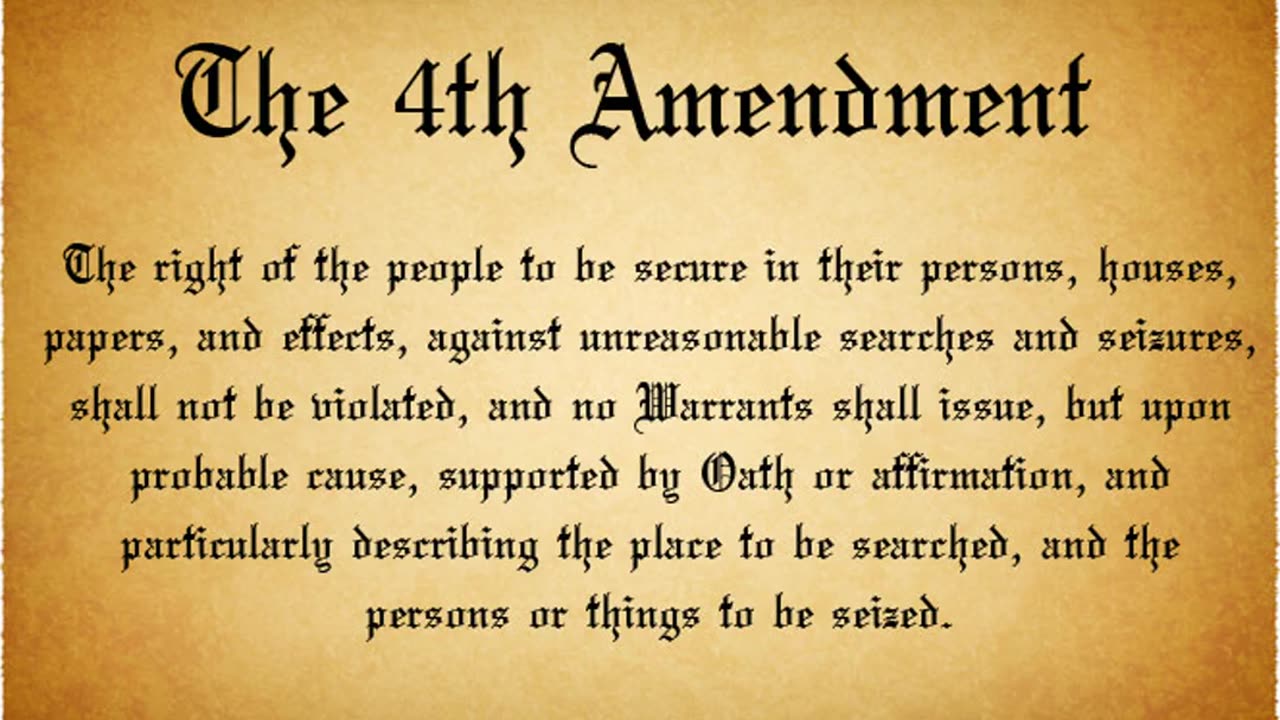Premium Only Content

The Fourth Amendment to the United States Constitution
The Fourth Amendment to the United States Constitution is a crucial part of the Bill of Rights, protecting citizens from unreasonable searches and seizures by the government. Here are the key points:
Protection Against Unreasonable Searches and Seizures: The Fourth Amendment ensures that individuals have the right to be secure in their persons, houses, papers, and effects. This means that law enforcement cannot conduct searches or seize property without a valid reason1.
Warrant Requirement: For a search or seizure to be considered reasonable, it generally must be conducted with a warrant. This warrant must be issued by a judge or magistrate and based on probable cause. The warrant must also specify the place to be searched and the items or persons to be seized.
Probable Cause: Law enforcement must have a reasonable basis to believe that a crime has been committed and that evidence of the crime is present in the place to be searched.
Exclusionary Rule: Evidence obtained in violation of the Fourth Amendment is typically inadmissible in court. This is known as the exclusionary rule, which aims to deter unlawful searches and seizures by law enforcement.
The Fourth Amendment has been interpreted and applied in various ways over the years, especially with the advent of new technologies and changing societal norms.
The Fourth Amendment’s application to digital surveillance and privacy issues has evolved significantly, especially with the rise of new technologies. Here are some key points on how it applies:
Digital Surveillance and Privacy
Expectation of Privacy: The Fourth Amendment protects against unreasonable searches and seizures, which includes digital data. The Supreme Court has ruled that individuals have a reasonable expectation of privacy in their digital communications and data, even when held by third parties.
Warrant Requirement: Law enforcement generally needs a warrant to access digital data. This was reinforced by the Supreme Court’s decision in Carpenter v. United States (2018), which held that accessing historical cell phone location data requires a warrant1. This decision marked a significant shift in how the Fourth Amendment is applied to digital information.
Third-Party Doctrine: Traditionally, the third-party doctrine allowed law enforcement to access information shared with third parties (like phone companies) without a warrant. However, recent rulings have started to limit this doctrine, recognizing that digital data can be highly personal and sensitive.
Technological Advances: As technology advances, courts are continually reassessing how the Fourth Amendment applies. For example, the use of GPS tracking, automated license plate readers, and other surveillance technologies are scrutinized to ensure they do not violate privacy rights.
Balancing Act: Courts often balance the government’s interest in security and law enforcement with individuals’ privacy rights. This balance is crucial in determining the legality of digital surveillance practices.
Key Cases and Developments
Carpenter v. United States: This landmark case established that accessing cell phone location data without a warrant violates the Fourth Amendment.
Riley v. California: The Supreme Court ruled that police must obtain a warrant before searching a cell phone seized during an arrest.
These rulings highlight the ongoing efforts to adapt the Fourth Amendment to the digital age, ensuring that privacy rights are protected even as technology evolves.
-
 20:12
20:12
GritsGG
7 hours agoABR Decimates Ranked Lobbies! Journey to Top 250! (Crim 2)
6.61K -
 1:43:12
1:43:12
The Michelle Moore Show
1 day ago'Trump Cracks Down On Immigration Through HUD, Churches Are Combat Ineffective, ChatGPT...Mechanism To Control People, Pam Bondi and Susie Wiles...Who Controls Access To Trump?' Mark Taylor: The Michelle Moore Show (Aug 18, 2025)
21K42 -
 LIVE
LIVE
Lofi Girl
2 years agoSynthwave Radio 🌌 - beats to chill/game to
226 watching -
 2:21:40
2:21:40
FreshandFit
6 hours agoOF Bimbo Gets TRIGGERED Over Systemic Racism! HEATED DEBATE
87.6K67 -
 2:03:03
2:03:03
Inverted World Live
11 hours agoPregnant Robots | Ep. 93
117K22 -
 LIVE
LIVE
Akademiks
6 hours agoDrake vs Roc Nation! Tory Lanez argues for new Trial! Bloodhound Q50 dodged 60 shots.
1,382 watching -
 1:58:16
1:58:16
Badlands Media
22 hours agoBaseless Conspiracies Ep. 146: GART Deadwood Highlights
83.9K24 -
 4:55:43
4:55:43
Drew Hernandez
13 hours agoTRUMP SECURES SETTING MEET BETWEEN PUTIN & ZELENSKYY
27.4K11 -
 5:06:26
5:06:26
SpartakusLIVE
10 hours agoSpartan HERO here to MOTIVATE the MASSES
58.5K2 -
 1:27:19
1:27:19
Badlands Media
22 hours agoCulture of Change Ep. 117: DARPA, Downloads & the Roots of the Narrative
67.8K9